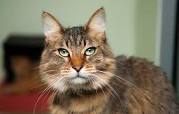Famciclovir reduces clinical signs in experimental feline herpes infection
Objective—To evaluate orally administered famciclovir for treatment of cats with experimentally induced disease attributable to feline herpesvirus type-1 (FHV-1).
Animals—16 nonvaccinated specific-pathogen–free cats.
Procedures—Cats were treated orally with famciclovir (90 mg/kg; n = 10) or a similar volume of lactose (400 mg; 6) 3 times/d for 21 days. Cats were inoculated with FHV-1 and administered the first treatment dose on day 0. Disease score; weight; results of urinalysis, serum biochemical analysis, and CBC; histologic conjunctivitis score; herpetic DNA shedding; goblet cell density; anti–FHV-1 antibody concentration; and plasma penciclovir concentration were measured.
Results—On days 4 to 18 following inoculation, disease scores were lower in famciclovirtreated cats than in lactose-treated cats. Lactose-treated cats decreased in weight during the first 7 days after inoculation, but famciclovir-treated cats increased in weight throughout the study. Percentage change in weight was greater in famciclovir-treated cats on days 7 and 14 than in lactose-treated cats. Serum globulin concentration was lower on days 3 through 9, conjunctivitis histologic score was lower on day 14, herpetic DNA was shed less frequently throughout the study, goblet cell density was greater on day 21, and circulating anti–FHV-1 antibody concentration at study end was lower in famciclovir-treated cats, compared with these measurements in lactose-treated cats. Approximate peak plasma penciclovir concentration was 2.0 µg/mL.
Conclusions and Clinical Relevance—Famciclovir administration improved outcomes for systemic, ophthalmic, clinicopathologic, virologic, and histologic variables in cats experimentally infected with FHV-1. Adjunctive topical mucinomimetic and antimicrobial treatments may also be necessary. (Am J Vet Res 2011;72:85–95)
Click here to be directed to the full article in the American Journal of Veterinary Research.

